
Nawab, also spelled Nawaab, Navaab, Navab, Nowab, Nabob, Nawaabshah, Nawabshah or Nobab, is a royal title indicating a sovereign ruler, often of a South Asian state, in many ways comparable to the western title of Prince. The relationship of a Nawab to the Emperor of India has been compared to that of the Kings of Saxony to the German Emperor. In earlier times the title was ratified and bestowed by the reigning Mughal emperor to semi-autonomous Muslim rulers of subdivisions or princely states in the Indian subcontinent loyal to the Mughal Empire, for example the Nawabs of Bengal.

Kathiawar is a peninsula, near the far north of India's west coast, of about 61,000 km2 (23,500 sq mi) bordering the Arabian Sea. It is bounded by the Gulf of Kutch in the northwest and by the Gulf of Khambhat in the east. In the northeast, it is connected to the rest of Gujarat and borders on the low, fertile hinterland of Ahmedabad. It is crossed by two belts of hill country and is drained radially by nine rivers which have little natural flow aside from in monsoon months, thus dams have been built on some of these. Kathiawar ports have been flourishing centres of trade and commerce since at least the 16th century.
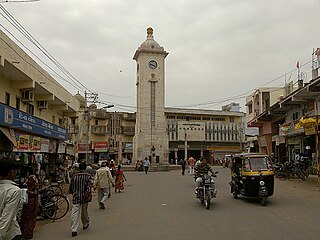
Khambhat, also known as Cambay, is a city and the surrounding urban agglomeration in Anand district in the Indian state of Gujarat. It was once an important trading center, but its harbour gradually silted up, and the maritime trade moved to Surat. Khambat lies on an alluvial plain at the north end of the Gulf of Khambhat, noted for the extreme rise and fall of its tides, which can vary as much as thirty feet in the vicinity of Khambat. Khambat is known for its halvasan sweet, sutarfeni, akik stone and kites (patang), and for sources of oil and gas.
Nawab Faiz Ali Khan Bahadur, was a ruler of the princely state of Banganapalle, including the Chenchelimala territory.
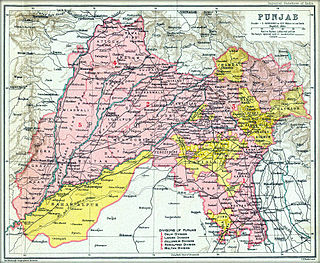
The Punjab States Agency was an agency of the British Raj. The agency was created in 1921, on the model of the Central India Agency and Rajputana Agency, and dealt with forty princely states in northwest India formerly dealt with by the Province of Punjab.

Tonk was a princely state of India at the time of the British Raj. The town of Tonk, which was the capital of the state, had a population of 273,201 in 1901. The town was surrounded by a wall and had a mud fort. It had a high school, the Walter hospital for women, under a matron, and a separate hospital for men. It has a bridge on the river Banas.
Ghogha is a census town in Bhavnagar district in the state of Gujarat, India. It is situated on the mid-western bank of the Gulf of Khambhat. It was an important historical commercial port on the Arabian Sea until the development of nearby Bhavnagar in the nineteenth century.
Muhammad Ali Khan, popularly known as Nawab Muhammad Ali Khan Bahadur, was perhaps the most well known and reputed Nawab of Masulipatam in India. He was preceded by Qutb Ud Daula. The Nawabs of Masulipatam ruled under the Nizam in east India. The title was later known as Nawab of Banganapalle, as they family shifted from the region of Masulipatam to the territory of Banganapalle. Nawab Muhammad Ali Khan Bahadur belongs to the dynasty of Najm-i-Sani.
The Nawabs of Masulipatam ruled under the Nizam in eastern India. The best known of them was Nawab Haji Hassan Khan.
Nawab Muhammad Taqi Khan Bahadur was Nawab of Masulipatam. He attacked Sisupalgarh town in 1731.
Nawab Ali Quli Mirza Bahadur was the ancestor of Nawabs of Banganapalle and Masulipatam. He belongs to The Najm-i-Sani Dynasty.
Faiz is a male Arabic name meaning "successful " and "winner" overflowing, plenty.
Hasan Mahmudi Kamboh was an ancestor of the Kamboh Nawabs of Meerut.

The Babi dynasty was a Afghan dynasty that formed the ruling royal houses of British India's princely states. The Babai community, originally of Afghan descent, largely resides in India and some parts of Pakistan. The community traces its royal origins to the dynasty founded by Sherkhanji Babi in 1654, who was himself a ruler from the dynasty's founding until 1690. The last Nawab of the British Indian princely state of Junagadh, Sir Muhammad Khanji, signed an Instrument of Accession and acceded his princely state of Junagadh, as well as its vassal state of Bantva Manavadar, to the Dominion of Pakistan after the Partition of British India in 1947. However, the Dominion of India did not recognize the accession and annexed the princely state shortly afterwards.
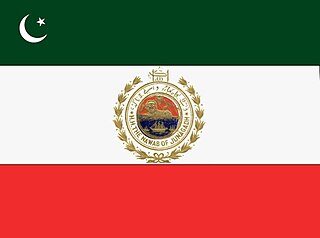
Junagarh or Junagadh was a princely state in Gujarat ruled by the Muslim Babi dynasty in India, which acceded to the Dominion of Pakistan after the Partition of British India. Subsequently, the Union of India annexed Junagadh in 1948, legitimized, controversially, through a plebiscite orchestrated the same year.
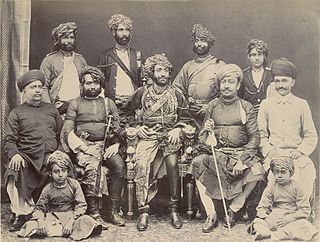
Nawab of Junagarh or Junagadh refers to the now defunct ex-lineage of rulers of the princely Junagarh State in British Raj, nowadays Junagadh district in the state of Gujarat in India. There are still several forts and palaces in India which were owned by princely Junagarh family but after Partition of India, this property was claimed by the Indian Government.
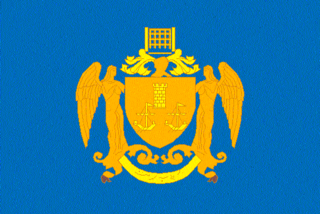
Cambay, Kambay, or Khambhat was a princely state in India during the British Raj. The City of Khambat (Cambay) in present-day Gujarat was its capital. The state was bounded in the north by the Kaira district and in the south by the Gulf of Cambay.
Dawood Ali Mirza was an Indian politician who was Member of the Rajya Sabha from Tamil Nadu. He was elected on 11 December 1956 and was Member till 2 April 1962. He was Member of the Indian National Congress.








